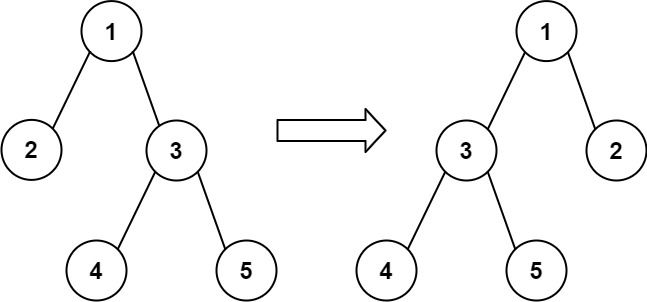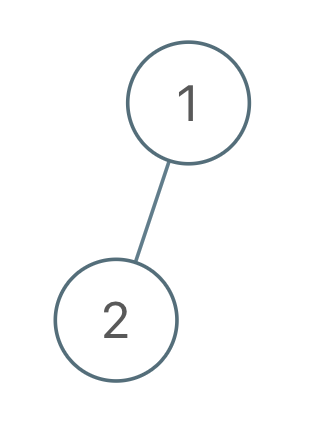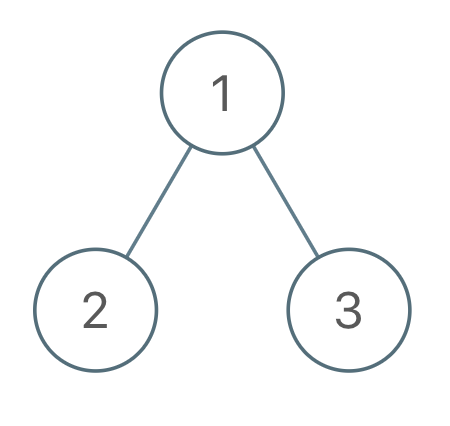给你一棵二叉树的根节点 root ,树中有 n 个节点,每个节点都有一个不同于其他节点且处于 1 到 n 之间的值。
另给你一个由 n 个值组成的行程序列 voyage ,表示 预期 的二叉树 先序遍历 结果。
通过交换节点的左右子树,可以 翻转 该二叉树中的任意节点。例,翻转节点 1 的效果如下:
请翻转 最少 的树中节点,使二叉树的 先序遍历 与预期的遍历行程 voyage 相匹配 。
如果可以,则返回 翻转的 所有节点的值的列表。你可以按任何顺序返回答案。如果不能,则返回列表 [-1]。
示例 1:
输入:root = [1,2], voyage = [2,1] 输出:[-1] 解释:翻转节点无法令先序遍历匹配预期行程。
示例 2:
输入:root = [1,2,3], voyage = [1,3,2] 输出:[1] 解释:交换节点 2 和 3 来翻转节点 1 ,先序遍历可以匹配预期行程。
示例 3:
输入:root = [1,2,3], voyage = [1,2,3] 输出:[] 解释:先序遍历已经匹配预期行程,所以不需要翻转节点。
提示:
- 树中的节点数目为
n n == voyage.length1 <= n <= 1001 <= Node.val, voyage[i] <= n- 树中的所有值 互不相同
voyage中的所有值 互不相同
我们可以通过深度优先搜索的方式遍历整棵树,用一个下标 false,并直接返回。否则,我们将
搜索结束后,如果 true,那么说明翻转后可以匹配,我们返回答案数组
时间复杂度
# Definition for a binary tree node.
# class TreeNode:
# def __init__(self, val=0, left=None, right=None):
# self.val = val
# self.left = left
# self.right = right
class Solution:
def flipMatchVoyage(self, root: Optional[TreeNode], voyage: List[int]) -> List[int]:
def dfs(root):
nonlocal i, ok
if root is None or not ok:
return
if root.val != voyage[i]:
ok = False
return
i += 1
if root.left is None or root.left.val == voyage[i]:
dfs(root.left)
dfs(root.right)
else:
ans.append(root.val)
dfs(root.right)
dfs(root.left)
ans = []
i = 0
ok = True
dfs(root)
return ans if ok else [-1]/**
* Definition for a binary tree node.
* public class TreeNode {
* int val;
* TreeNode left;
* TreeNode right;
* TreeNode() {}
* TreeNode(int val) { this.val = val; }
* TreeNode(int val, TreeNode left, TreeNode right) {
* this.val = val;
* this.left = left;
* this.right = right;
* }
* }
*/
class Solution {
private int i;
private boolean ok;
private int[] voyage;
private List<Integer> ans = new ArrayList<>();
public List<Integer> flipMatchVoyage(TreeNode root, int[] voyage) {
this.voyage = voyage;
ok = true;
dfs(root);
return ok ? ans : List.of(-1);
}
private void dfs(TreeNode root) {
if (root == null || !ok) {
return;
}
if (root.val != voyage[i]) {
ok = false;
return;
}
++i;
if (root.left == null || root.left.val == voyage[i]) {
dfs(root.left);
dfs(root.right);
} else {
ans.add(root.val);
dfs(root.right);
dfs(root.left);
}
}
}/**
* Definition for a binary tree node.
* struct TreeNode {
* int val;
* TreeNode *left;
* TreeNode *right;
* TreeNode() : val(0), left(nullptr), right(nullptr) {}
* TreeNode(int x) : val(x), left(nullptr), right(nullptr) {}
* TreeNode(int x, TreeNode *left, TreeNode *right) : val(x), left(left), right(right) {}
* };
*/
class Solution {
public:
vector<int> flipMatchVoyage(TreeNode* root, vector<int>& voyage) {
bool ok = true;
int i = 0;
vector<int> ans;
function<void(TreeNode*)> dfs = [&](TreeNode* root) {
if (!root || !ok) {
return;
}
if (root->val != voyage[i]) {
ok = false;
return;
}
++i;
if (!root->left || root->left->val == voyage[i]) {
dfs(root->left);
dfs(root->right);
} else {
ans.push_back(root->val);
dfs(root->right);
dfs(root->left);
}
};
dfs(root);
return ok ? ans : vector<int>{-1};
}
};/**
* Definition for a binary tree node.
* type TreeNode struct {
* Val int
* Left *TreeNode
* Right *TreeNode
* }
*/
func flipMatchVoyage(root *TreeNode, voyage []int) []int {
i := 0
ok := true
ans := []int{}
var dfs func(*TreeNode)
dfs = func(root *TreeNode) {
if root == nil || !ok {
return
}
if root.Val != voyage[i] {
ok = false
return
}
i++
if root.Left == nil || root.Left.Val == voyage[i] {
dfs(root.Left)
dfs(root.Right)
} else {
ans = append(ans, root.Val)
dfs(root.Right)
dfs(root.Left)
}
}
dfs(root)
if !ok {
return []int{-1}
}
return ans
}/**
* Definition for a binary tree node.
* class TreeNode {
* val: number
* left: TreeNode | null
* right: TreeNode | null
* constructor(val?: number, left?: TreeNode | null, right?: TreeNode | null) {
* this.val = (val===undefined ? 0 : val)
* this.left = (left===undefined ? null : left)
* this.right = (right===undefined ? null : right)
* }
* }
*/
function flipMatchVoyage(root: TreeNode | null, voyage: number[]): number[] {
let ok = true;
let i = 0;
const ans: number[] = [];
const dfs = (root: TreeNode | null): void => {
if (!root || !ok) {
return;
}
if (root.val !== voyage[i++]) {
ok = false;
return;
}
if (!root.left || root.left.val === voyage[i]) {
dfs(root.left);
dfs(root.right);
} else {
ans.push(root.val);
dfs(root.right);
dfs(root.left);
}
};
dfs(root);
return ok ? ans : [-1];
}

